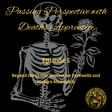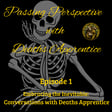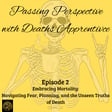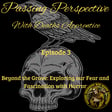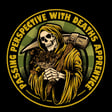Become a Creator today!Start creating today - Share your story with the world!
Start for free
00:00:00
00:00:01

Who’s Who in the Afterlife Arena: Navigating the Modern Death Industry
Main Theme:
This episode explores the intricate world of death planning, emphasizing the necessity for up-to-date records amidst frequent changes in funeral industry personnel. It contrasts traditional perceptions with modern shifts and highlights the increasing demand for diverse services.
Key Topics Covered:
Changing Funeral Industry Dynamics:
Emphasis on the importance of keeping updated records due to high personnel turnover.
The shift from traditional funerals to cremations driven by cost-effectiveness.
Challenges for Funeral Directors:
Balancing professional and personal life amid evolving industry demands.
The need for multitasking and outsourcing due to reduced staff.
Role of Large Corporations:
Many funeral homes are now owned by larger companies, impacting sponsorships and operational practices.
Staffing and Services:
Common reliance on office staff, answering services, dedicated removal teams, and contract embalmers.
Cremation services often managed online, with limited additional offerings.
Pre-Planning Professionals:
Involvement of death doulas, lawyers, accountants, insurance agents, and hospice care providers.
Unexpected Industry Interactions:
Insight into interactions with doctors, hospital staff, emergency services, and crime scene cleanup teams.
Future Industry Trends:
Exploration of new body disposal options, including cryogenics and other alternatives beyond traditional burial and cremation.
Viking Funerals:
Regulatory and environmental challenges associated with traditional Viking-style funerals.
Colorado’s unique position as the only U.S. state allowing legal outdoor funerals.
Humorous Insights and Encouragement:
Light-hearted touches on potential beliefs about death, such as zombification fears.
An invitation to listeners to engage in discussions to destigmatize death.
Additional Resources:
Listeners are encouraged to visit the podcast’s website for more information and resources on the death industry.
Upcoming Discussions:
The episode hints at future topics, including hospice care and innovative body disposal methods, prompting listeners to consider their post-death preferences.
Transcript
Introduction to 'Passing Perspective with Death's Apprentice'
00:00:06
Speaker
Thank you for listening to Passing Perspective with Death's Apprentice.
00:00:11
Speaker
Being that this is a podcast about death, dying, and grief, some topics discussed may be triggering for some or not suitable for younger listeners, hence the explicit rating.
00:00:24
Speaker
Listener discretion is advised.
00:00:28
Speaker
Enjoy the show.
Overview of Death Industry Professionals
00:00:40
Speaker
Welcome again to Passing Perspective.
00:00:43
Speaker
I am your host, Death's Apprentice.
00:00:46
Speaker
Back with another exciting episode where we talk about all things death, dying, and grief.
00:00:52
Speaker
Last week, we went into death and horror in the media and literature and why people love it and what draws people to it.
00:01:00
Speaker
At the end of the episode, I answered the question of who to call when someone dies, whether the death is expected or unexpected.
00:01:08
Speaker
This week, we are discussing who is who in the death industry.
00:01:14
Speaker
You know who to call in the event of a death, but who are the people you will be interacting with?
00:01:20
Speaker
Throughout the planning process, or even after an unplanned death has occurred,
00:01:26
Speaker
You're going to come in contact with a lot of different people with a lot of different jobs.
00:01:31
Speaker
I always recommend collecting business cards and saving them in your death finders so they will be easier to find later.
00:01:37
Speaker
Keep in mind that with fluctuations in employment, the person you may speak to now could quite possibly not work there anymore, even a year from now.
00:01:47
Speaker
That's okay.
00:01:48
Speaker
Most times there is another person there who will be able to assist you just as well.
00:01:54
Speaker
The main thing is to have the right place.
00:01:57
Speaker
I spoke in the second episode about updating your death plans frequently.
00:02:02
Speaker
Another reason for this is because funeral homes do close and people change jobs.
00:02:10
Speaker
So you need to keep up to date with those details.
00:02:13
Speaker
It never hurts to check in.
00:02:16
Speaker
I'm going to give you a brief overview on how you may interact with each of these professionals in the course of your death journey.
00:02:24
Speaker
You may not end up interacting with all of them.
00:02:28
Speaker
So get your notebooks ready.
Funeral Home Operations: Changes and Challenges
00:02:30
Speaker
Here is the crash course of who you will meet while planning a death or when someone dies.
00:03:04
Speaker
Music
00:03:09
Speaker
When you think of death, one of the first things you think of is a funeral home or an undertaker.
00:03:15
Speaker
You imagine a tall, grim guy lurking around a cemetery, not smiling, or even, based on experiences, a grim man who lives in a funeral home with his family, essentially doing all of the things.
00:03:27
Speaker
Six feet under anyone?
00:03:29
Speaker
That show was pretty true to form regarding the funeral industry and even the changes it was starting to face in the last few decades.
00:03:37
Speaker
The face of the funeral industry is changing.
00:03:40
Speaker
Along with it, the images we conjure of a funeral home and a funeral director.
00:03:46
Speaker
With the amount of death faced a day with an ever-increasing population, it is no longer practical for a funeral home to be a one-man show or even a small family affair.
00:04:00
Speaker
Now, those may still exist in some small towns scattered throughout the country, but even then,
00:04:06
Speaker
it is not actually a 24-hour venture.
00:04:10
Speaker
Like, man, even the funeral director needs a life outside of their work, right?
00:04:15
Speaker
With the decline in traditional funerals and a rise in the cheaper alternative of cremation, the industry is undergoing massive changes.
00:04:25
Speaker
Funeral homes are keeping less staff on payroll.
00:04:29
Speaker
The funeral director may do everything themselves or they may hire out for some services.
00:04:34
Speaker
You may deal with a bigger funeral home or one that is being managed by a bigger company complete with casket company sponsorships.
00:04:45
Speaker
Either way, the industry is struggling to keep up with the changes.
00:04:48
Speaker
There have been a few news stories lately about funeral homes found with lots of bodies improperly handled.
00:04:56
Speaker
I think there's been two in the last six months I've seen.
Roles and Services in Funeral Homes
00:05:00
Speaker
And it's usually due to debt or an inability to pay.
00:05:03
Speaker
Actually, I'm thinking I'm going to do a whole episode about that.
00:05:07
Speaker
About that.
00:05:08
Speaker
when things go wrong in the death industry.
00:05:11
Speaker
But for now, there may be a lot of people you come in contact with based on how things are changing in the future and now.
00:05:20
Speaker
In the funeral home itself, you may find an office person.
00:05:25
Speaker
Many hats and names, but this is your phone and paperwork person.
00:05:29
Speaker
The one who keeps the business side of things running in the background and interacts with the public the most.
00:05:37
Speaker
This is the person you speak with first or you see first.
00:05:40
Speaker
Because even though funeral homes advertise as being open 24 hours a day, that is mainly in a death sense.
00:05:48
Speaker
Operations are barely covering business hours at this point, and very few funeral homes can operate staff at those hours.
00:05:56
Speaker
That being said, outside of normal business hours, Monday through Friday, 8 to 5, you are likely to get an answering service when you call.
00:06:06
Speaker
Generally, someone will be on call, but the answering service is there to ensure that they aren't waking up all night to calls about death certificates, but are waking up for the death calls.
00:06:22
Speaker
Which brings me to the next person, the removal team.
00:06:26
Speaker
These are sometimes employees, but lately more and more removal services are popping up that are strictly for removing and delivering bodies for funeral homes or the death industry.
00:06:38
Speaker
It is like a whole
Cremation Services: Logistics and Options
00:06:40
Speaker
industry in and of itself.
00:06:42
Speaker
Some places it may be the funeral director that comes out, but those days are dying fast.
00:06:50
Speaker
Pun completely intended.
00:06:53
Speaker
You may or may not come in contact with the embalmer.
00:06:56
Speaker
These days, this is becoming more and more like contract work because while it is an art, with more people opting for cheaper alternatives or more natural alternatives, the traditional is becoming less and less and they're finding less and less work just for embalming.
00:07:17
Speaker
along with the staff i mentioned there will also be apprentices funeral assistants maybe many other positions in the funeral home itself sometimes you may not go the route of the funeral home there are so many companies dealing strictly with cremation now and that is all they do sometimes they contract with funeral homes since the cost of cremation equipment is a huge investment
00:07:42
Speaker
As well as regulations on locations and space locally, not every funeral home has a crematory on site.
00:07:49
Speaker
So generally the funeral home you go to for cremation basically ships you off to one that does.
00:07:54
Speaker
Generally at a rate lower than what you paid them and at a rate about the same as if you went to the crematory directly.
00:08:01
Speaker
You didn't hear that from me.
00:08:03
Speaker
Although, always do your homework.
00:08:05
Speaker
You may or may not meet the crematory operator.
00:08:07
Speaker
This depends on the place and regulations.
00:08:09
Speaker
Some places will let you view your loved one's cremation, but don't count on that.
00:08:13
Speaker
These cremation companies, some even being strictly online companies, basically allow you to arrange everything
Pre-Planning and End-of-Life Care
00:08:20
Speaker
online and through email and even pay online and will include things with an overall price or package deal.
00:08:27
Speaker
Most of the time, though, this is strictly cremation and no other services are provided.
00:08:31
Speaker
This can also be the case with donation, whether you sign contracts in advance or after your loved one passes.
00:08:37
Speaker
They will cover a cremation and transportation.
00:08:40
Speaker
Sometimes you may only meet donation places when someone passes, and trust me, they will find you.
00:08:47
Speaker
Aside from inside the funeral home or crematory, there are also others you may or may not have contact with depending on the services you choose.
00:08:56
Speaker
If you're going a traditional route,
00:08:57
Speaker
You will be in contact with a cemetery or other final resting place.
00:09:02
Speaker
Generally, plots, niches, etc.
00:09:04
Speaker
are pre-purchased.
00:09:06
Speaker
You also need to secure clergy in this, and cemetery plots can be difficult to secure after death.
00:09:12
Speaker
Just like with weddings, clergy may only do services for members of their congregations.
00:09:17
Speaker
Same with cemeteries, and some cemeteries have other restrictions as well, so it's important to really look into those when deciding.
00:09:25
Speaker
Last in this category is a florist.
00:09:27
Speaker
This is not so much a pre-planning thing, but it is a consideration when someone passes.
00:09:32
Speaker
The next group of people you may come in contact with are in relation to pre-planning.
00:09:38
Speaker
I've touched on some of these already in the second episode.
00:09:42
Speaker
A death doula is someone you can go to for basically end-of-life planning and advocacy for your death.
00:09:48
Speaker
They will assist through the end of life and after with grief as well, depending on their focus.
00:09:53
Speaker
Some focus more on some aspects of death while others may focus on a different one.
00:09:59
Speaker
And
Handling Unexpected Deaths
00:10:00
Speaker
it's usually based on the dual's background and interest as death is so encompassing.
00:10:04
Speaker
There's so many aspects to it.
00:10:06
Speaker
Along with your pre-planning route, I mentioned lawyers, accountants, financial planners, estate planners, insurance people, and some of those
00:10:14
Speaker
you will interact with when someone passes as well.
00:10:17
Speaker
Along with those, you meet with pre-planning and other professional you may have contact with, whether for yourself or a loved one is hospice.
00:10:25
Speaker
I am planning a whole episode about hospice soon, but they are essentially end-of-life care when it is imminent.
00:10:32
Speaker
This is the option when there is no more medical intervention or life-saving and it has moved to comfort measures.
00:10:39
Speaker
This is not something you plan until you have to.
00:10:42
Speaker
but something to keep in mind that is available.
00:10:46
Speaker
With unexpected deaths, and I'll also touch on this more in an upcoming episode, but there are a few others you may interact with.
00:10:53
Speaker
And I mentioned a lot of them in the question at the end of last week's episode about who you call when someone dies or who may call you.
00:11:01
Speaker
You may interact with doctors or staff at the hospital who may or may not be doctors or nurses like security or decedent affairs.
00:11:10
Speaker
You may interact with 911 dispatchers, police, or even EMS.
00:11:14
Speaker
Depending on the type of death you've encountered, you may also interact with a coroner, medical examiner, or in Texas, a justice of the peace.
00:11:21
Speaker
The last professional is one that hopefully you may never need to use, crime scene cleanup.
00:11:27
Speaker
There are companies that specialize in that deep cleaning needed after a death has occurred.
00:11:33
Speaker
If you find yourself in this situation, rest assured there is a company that does that.
00:11:38
Speaker
so you don't have to.
Legal Body Disposal Methods in the U.S.
00:11:40
Speaker
And ending on that gruesome note, I hope you are at least a little prepared for the inevitable and have a general idea of who is who in the death industry.
00:11:52
Speaker
And now for the question of the week.
00:12:28
Speaker
For this week, the question of the week is, what is the most interesting method of legal body disposal in the United States?
00:12:38
Speaker
In my death journey, I explored so many of these options and I feel like there is a new option coming up constantly.
00:12:48
Speaker
No more is it just cremation or traditional burial with the church and casket and vault and embalming, but so many more things that you can do.
00:12:59
Speaker
Growing up, the big talk was being cryogenically frozen.
00:13:04
Speaker
I think it hit the news like possibly in the 80s.
00:13:07
Speaker
I'm not positive.
00:13:08
Speaker
I was a kid.
00:13:09
Speaker
I don't remember a lot.
00:13:11
Speaker
But it was about somebody doing it or some kind of scientific breakthrough.
00:13:14
Speaker
And in the end, it became like a whole urban legend about
Encouragement for Open Discussions on Death
00:13:20
Speaker
how Walt Disney was frozen.
00:13:23
Speaker
And then I heard it was just his head.
00:13:25
Speaker
And then there was this whole Futurama premise about cryogenics.
00:13:31
Speaker
It was kind of a big deal.
00:13:33
Speaker
But as I got older...
00:13:35
Speaker
and internet became a thing.
00:13:37
Speaker
I don't believe that it is yet possible to be revived after being frozen.
00:13:42
Speaker
I'll have to look that one up, because I'm really not sure.
00:13:45
Speaker
But it is a nice, comforting concept.
00:13:49
Speaker
But that definitely falls into the live forever category of death beliefs, which will come later.
00:13:56
Speaker
Back to current reality, there is no shortage of ways to dispose of a body that are legit.
00:14:03
Speaker
And not just that, there is a whole lot of things to do with cremains once a loved one is cremated.
00:14:10
Speaker
I will touch on a lot of these in the next episode and go into some, a lot more detail later for now, just to get you thinking about possibilities.
00:14:22
Speaker
I talk to a lot of people.
00:14:24
Speaker
And I'm a weirdo, so generally the conversation will steer to death.
00:14:30
Speaker
And the topic of body disposal generally comes up.
00:14:34
Speaker
It's an innocuous... So what do you want to happen to your body when you die?
00:14:39
Speaker
It's not surprisingly one I hear quite frequently.
00:14:43
Speaker
And this is kind of just to get you thinking about possibilities, because I have definitely looked into this one.
00:14:50
Speaker
The one thing I hear a lot of people talk about is a Viking funeral.
00:14:56
Speaker
A funeral pirate.
00:14:58
Speaker
As you can imagine, a Viking funeral would present a lot of red tape and environmental concerns, open flames and all that.
00:15:08
Speaker
There is also the consideration that crematory retorts operate at substantially higher temperatures than a regular open funeral pyre.
00:15:18
Speaker
Therefore, the whole process is probably not for the faint of heart.
00:15:22
Speaker
Based on some of these conditions and regulations and restrictions and the whole belief that death is unsanitary and that you can, like, become a zombie if you breathe in the air near where someone's dead body was burned or buried, didn't you know that is actually how the zombie apocalypse starts?
00:15:40
Speaker
But regardless, one place was not afraid of all of that.
00:15:45
Speaker
and actually has, from what I've looked into, very little oversight on the death industry in general.
00:15:52
Speaker
I'm going to give you a moment to guess which U.S. state has the only legally operating outdoor funeral pyre in the whole country.
00:16:05
Speaker
If you guessed Colorado, you are correct.
00:16:09
Speaker
You can get your Viking funeral in Colorado.
00:16:13
Speaker
If you're looking for more information, you can check out CrestinEndofLifeProject.org and under their services option, you can check out Open Air Cremation site.
00:16:25
Speaker
You can find all of the details there and I hope to maybe get an interview with them later.
00:16:31
Speaker
But for now, that is my take on one of the more interesting legal ways to dispose of a body.
00:16:39
Speaker
And now a quote.
Episode Wrap-Up and Listener Engagement
00:16:42
Speaker
Everybody wants to go to heaven, but nobody wants to die.
00:16:48
Speaker
Unknown author.
00:17:22
Speaker
Thank you for listening to this episode of Passing Perspective, where we discussed all the things for who's who in the death industry.
00:17:32
Speaker
I hope you learned more than you ever dreamed about death and dying.
00:17:37
Speaker
My dreams are that you take this information and go out and start working on your own death plans and thinking about your own demise.
00:17:46
Speaker
I want you to go out and discuss death with your friends and family and complete strangers and engage in the dialogue that really matters.
00:17:54
Speaker
The only way to remove the stigma is to talk about it.
00:17:59
Speaker
I welcome your stories and questions and any input on the show.
00:18:02
Speaker
And you can find me at www.passingperspective.com where you can find show notes and links, a blog, and you can find me on Facebook at Passing Perspectives.
00:18:14
Speaker
and on Instagram at Passing Perspective Podcast.
00:18:19
Speaker
As always,
Credits and Acknowledgments
00:18:20
Speaker
Passing Perspective with Desa Apprentice can be found on all of your favorite streaming services.
00:18:26
Speaker
Kindest regards, Desa Apprentice.
00:18:49
Speaker
Thank you for listening to this episode of Passing Perspective with Des Apprentice.
00:18:55
Speaker
All episodes are written, hosted, and produced by Des Apprentice.
00:19:00
Speaker
Music is a calm hellfire by The Wayward Hearts.
00:19:05
Speaker
Licensing by Upbeat.
00:19:08
Speaker
Tune in for next week.
00:19:10
Speaker
See you then.
00:20:44
Speaker
The End
